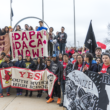So many questions. So few answers. So much drama.
I have a few questions.
1. Why hasn’t the White House formally asserted executive privilege to preclude Steve Bannon from substantively answering questions posed by special counsel Robert Mueller and his investigators? Do White House attorneys not believe Bannon’s reported claim that he plans to talk candidly to Mueller and company before a grand jury or more informally? Or that Bannon believes there is no valid privilege between executive branch officials that would preclude his testimony because both he and Mueller (appointed by the Justice Department) were and are creatures of the executive branch? Or does the White House believe the president and his fellow travelers have nothing to lose if Bannon talks to Mueller? If that is so, and it’s unlikely, then why did White House lawyers reportedly block Bannon from cooperating with the House intelligence committee one question at a time?
2. Has the White House asserted the privilege and we don’t yet know it? Is the White House going to continue to employ that mealy-mouth trick, made famous by Attorney General Jeff Sessions during one of his appearances before the Senate Judiciary Committee, of mentioning “executive privilege” as a justification for refusing to answer questions but then refusing or failing to actually invoke the privilege? Or is there a more mundane reason for why the White House doesn’t seem to be doing anything to stop Bannon from cooperating with Trump’s arch enemy? Maybe the current delay in asserting the privilege is another example of incompetent lawyering by the same federal lawyers who waited for days to appeal last week’s DACA ruling, the same folks who waited too long late last year in the case of the young undocumented immigrant seeking an abortion?
3. What happens if Bannon talks to Mueller before the White House asserts the privilege and then the privilege is asserted? Would the White House then be able to preclude Mueller from using Bannon’s testimony at some subsequent trial? Probably, but how exactly would that be enforced? Would Mueller and his team be able to use information gleaned from Bannon to engage in other discovery? How would the courts evaluate such “derivative use” if it were part of a future criminal case? And what will happen if the White House tries to claim executive privilege over communications between Bannon and others that took place during the transition, i.e. before there was an “executive” to assert the “privilege?” It’s hard to imagine even the conservative Supreme Court being willing to expand the scope of the privilege to the months of the Trump transition. Good news for Mueller talking to Bannon about Russians. Maybe less good news for Mueller talking to Bannon about Comey.
4. Let’s say Bannon talks to Mueller but continues to refuse to talk to federal lawmakers on Capitol Hill? What can Devin Nunes and his band of renown do then? It depends on what reason Bannon gives for his refusal to talk to Congress, I suppose. If the White House asserts executive privilege over Bannon’s congressional testimony the conflict may end up in court—and why would the administration assert the privilege in the context of Congress but not in the context of Mueller? The omission of one might constitute a waiver of the other. If Bannon asserts his Fifth Amendment right against self-incrimination the House Intelligence Committee could either try to hold him in civil contempt or try to grant him immunity. The first option would make for great political theater. The second option would create the possibility of Oliver North-like problems for Mueller and Congress. What would not happen? Rep. Nunes could not get access to the transcript of Bannon’s testimony before the special counsel.
The closer we move toward the resolution of these investigations, the closer we move toward the heart of the story of the Trump team’s dubious Russian ties, the more complicated become the legal questions attached to this drama. Pro tip? Follow Mueller. It’s where the action is. Don’t follow Congress. It’s a distraction. Second pro tip? Try to buy stock in the restaurants, coffee houses, and parking lots near the E. Barrett Prettyman courthouse in Washington, D.C. Unless something dramatic changes, I suspect a great many folks are going to spending a great deal of time there in the coming year.
Andrew Cohen is a senior editor at the Marshall Project, a fellow at the Brennan Center for Justice, and a senior legal analyst with CBS Radio News.







0 Comments